Bass With a Voice: An Interview With Danielle Schnebelen
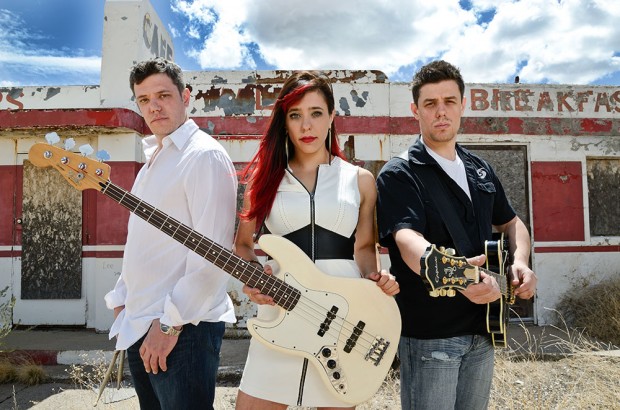
Trampled Under Foot is making a big splash with their first major label release, Badlands, a thirteen track collection of soulful and gritty blues tunes that groove like no other. The sibling power trio is fronted by singer/bassist Danielle Schnebelen, who pours her soul out in heartfelt lyrics and low notes.
“All I really want to do is inspire goodness in people. I’m really passionate about the blues and about music,” Danielle says of her music. “My lyrics are really personal to me; I’m like an open book. I’m always honest about the music, and I hope I can inspire people. I want the listener to get something out of it. I want the audience to have a good time dancing and laughing with me while I take them on a journey.”
After years of honing her craft as a lead singer in blues bands in her hometown of Kansas City, Schnebelen banded together with her siblings Nick and Kris to form Trampled Under Foot. With Nick on guitar and Kris on drums, it was up to Danielle to pick up bass in addition to her vocal duties. Her dedication and persistence paid off and was proven when the band won first place at the Blues Foundation’s 24th International Blues Challenge in 2008. The event opened up lots of doors for the band.
We caught up with Danielle to get the scoop on her musical upbringing, her bass playing, and TUF’s new album, Badlands.
You grew up in Kansas City and had a lifetime of music education – formally and informally. Of course, your parents were very musical and you got to meet lots of blues and roots musicians, and that had a lot to do with your musical upbringing. What stands out from that time as helping form your musical knowledge?
I always remember my dad’s humongous record collection. There were just records everywhere. He worked at a record store when he was a teenager and so he was able to get his hands on all kinds of music, so I really remember just seeing and hearing all different genres. But when I knew that I wanted to do blues was because Kansas City used to have this awesome festival called the Spirit Festival, and we also had the Blues and Jazz Festival. They were huge festivals. In one year I saw B.B. King for the first time and I saw Etta James for the first time, and that was pretty much when I knew that blues is what’s in my heart. I started singing Koko Taylor, and my mom covered some Koko Taylor so I’d sing with her. So that kind of attributed to gravitating towards the blues. My dad fell in love with Johnny Winter, and then through Johnny Winter he found Muddy Waters, and then through Muddy Waters he found Robert Johnson and Skip James and all the old school cats. It was really just quite a few things stick out in my mind throughout the years.
You mentioned your first gig was when you were twelve years old, singing Koko Taylor’s “Never Trust a Man.” It seems like that’s kind of a defining moment for you.
[laughs] Well, yeah. It was that my parents were doing a Blues for Schools thing. Actually how it all came to be is that they would have rehearsals at my dad’s house. So we would sit down in the basement and listen to the rehearsals and stuff. “Never Trust a Man” was playing as they were taking a break and talking, so I just grabbed the mic and started singing it. My dad say, “Hey, why don’t you come and play with us?”
So I did the rehearsals with them a couple times, then I got up with them and sang. It just goes to show that blues not only shows no color, but any person of any age can understand it, because it’s all about feeling. Everybody feels, no matter how old you are or how young you are.
I had been practicing all week and I was ready to go. I got pulled out of school for it, and I was like “I’ve got a gig with my parents!” So when I finally got up there, of course I just totally froze and forgot the words to it [laughs]. It was completely embarrassing, but I was also twelve at the time, so you know… It didn’t discourage me from doing it either though. My dad [just said], “You know, that’s going to happen.” I played it off and my dad took a solo, then I remembered the words and everything was fine. So my first show was a very humbling experience.
So you were always a singer, and you didn’t start playing bass until you started playing with your brothers?
Right.
So it sounds like it was more of a necessity to start playing bass than having the instrument coming to you. How has that worked out for you?
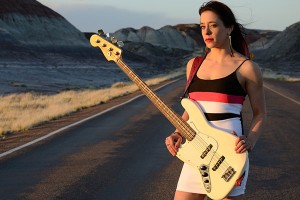 You know, I really love it. I really, really, really love playing bass. I love being part of the foundation. I took dance for a long time, and my strongest was Tap and Jazz, which are very rhythmically based, so when I talked to my brothers about playing bass I said, “Well, I’ll just try it out and see how it goes,” because obviously being a lead singer and playing bass at the same time… I knew it was going to be very difficult.
You know, I really love it. I really, really, really love playing bass. I love being part of the foundation. I took dance for a long time, and my strongest was Tap and Jazz, which are very rhythmically based, so when I talked to my brothers about playing bass I said, “Well, I’ll just try it out and see how it goes,” because obviously being a lead singer and playing bass at the same time… I knew it was going to be very difficult.
I think because I was a singer first, it was easier rather than learning the bass first, because I could already let go and sing. So all I had to think about was my fingers as opposed to vice versa. It’s still difficult, especially when I’m doing funk songs, because the vocals are completely opposite [of the bass line.] I had a really hard time [starting,] but I just sat on my front room floor for hours a day, just walking up and down the neck and singing along. Every time I’d practice I’d be singing along. I was picking up gigs as a bass player as often as I could, and people that were really nice enough to give me a chance and hire me I really appreciated it [laughs].
Just like anyone learning an instrument for the first time, you’re not good for a long time. You gotta practice, and you gotta get out there and screw up a bunch to learn what not to do. It’s not necessarily failing, but making mistakes is how you grow a lot. You have to have triumphs and failures.
Were there any specific practice routines you’d go through to help yourself play bass and sing at the same time?
Well, I was mostly doing swing, because it’s a pretty easy pattern to start out with and it’s constantly moving. So it’s not like a slow blues, where you’re ringing out notes forever. I was just doing songs I would do with my band. I [knew I had work to do], and I’d play bass as much I could and sing the songs with the band, just so I could get the optimum practice.
I didn’t really do too much scale work, it was just kind of more straight up on-the-job experience kind of thing. I was still fronting my band Fresh Brew when we first started talking about doing Trampled Under Foot, but Chris and I weren’t able to move out to Philadelphia when we wanted to, so I started fronting another band called The Nortons. All the bass players in those bands were really nice enough to give me direction and let me get up and play bass. Like with The Nortons, the bass player Dane Henningson also played trombone, so we’d switch out and I’d grab my bass and play some songs so we’d have a horn section. It was actually a really cool part of the show. Everything just kind of worked out and fell into place.
It was very hard work, but I had a lot of cool cats that were supportive around me.
Which bassists do you follow for inspiration?
There are so many. As far as the older school cats go, I love the melodies of Willie Dixon. He wasn’t the most technically proficient, but he was really melodic and creative with his bass lines. Of course there’s the hook with James Jamerson. That’s really like the blues and the Motown thing for me.
I love John Paul Jones. He’s just phenomenal. He plays bass kind of more like a guitarist – obviously he played so many instruments that he wasn’t just a bass player. I think that’s why I have such a hard time learning some of his stuff, because we do Led Zeppelin every now and then, and that’s the hardest stuff to sing and play against.
And Les Claypool is a bad man, talking about more modern bass players. I just take inspiration from anywhere I can.
Your brother Chris said that bonds between musicians are stronger when those musicians are family members. Can you tell us about the family dynamic and how that translates into the band?
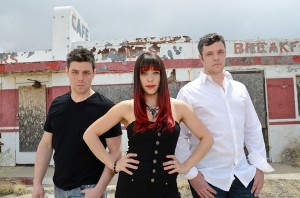 Any band that aspires to do it as a career, they’re already brothers in arms just making that commitment alone because the road is lonely, you know? I feel really fortunate to not only get along with my family but to actually be able to get the instruments together to do a family act and be able to keep it a power trio, and not have to rely on anybody else. It’s great to have that bond out there, especially when we travel over to Europe, because it’s a big world. You get into different cultures and it can get to be really lonely.
Any band that aspires to do it as a career, they’re already brothers in arms just making that commitment alone because the road is lonely, you know? I feel really fortunate to not only get along with my family but to actually be able to get the instruments together to do a family act and be able to keep it a power trio, and not have to rely on anybody else. It’s great to have that bond out there, especially when we travel over to Europe, because it’s a big world. You get into different cultures and it can get to be really lonely.
If you want to talk about it musically, it’s a stronger connection because we all have the same taste in music. So we don’t really fight about what direction our songs are going to go or how to write [them]. We don’t really have a lot of arguments there.
When you’re talking about actually performing the music, we can throw up cues that we each know, just because we’re siblings. Nick might try to put a different section in there musically, and Chris and I will just pick up on it. It wasn’t something that was there when we started. It was something that had to be worked on, and now we’re in our eleventh year. We’re very fortunate that we can get up there and try new stuff that we haven’t done at a festival before. Nine times out of ten, it works out. There’s always that one time though [laughs].
When we shared the video of Trampled Under Foot performing “Love My Baby,” lots of people commented on how your band has two lefties.
Yeah, [Nick and I] both do everything left-handed. What’s weird about it is that nobody else in our entire family is left-handed. We don’t know where it came from. I feel bad because we’ll be signing CDs or something and somebody will walk up and say, “Hey, are all three of you left-handed?” And Kris will go, “No, I’m right handed,” then they say, “Oh,” and walk off like we lost the novelty or something. People are funny.
Tell me about your new album, Badlands.
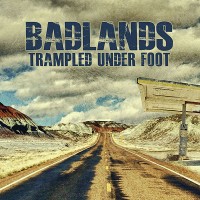 We are really excited about this album. We spent about a year writing it in collaboration with our producer Tony Braunagel. He was on Wrong Side of the Blues and co-wrote some of the songs on that album, so when we went back into the studio, we had what I call the “dream team” at Ultratone in Studio City outside of L.A., which was Johnny Lee Schell and Tony Braunagel. We had such a good time on the Wrong Side of the Blues album that we just started getting songs together immediately. We were able to get Mike Finnegan again and he’s just all over it.
We are really excited about this album. We spent about a year writing it in collaboration with our producer Tony Braunagel. He was on Wrong Side of the Blues and co-wrote some of the songs on that album, so when we went back into the studio, we had what I call the “dream team” at Ultratone in Studio City outside of L.A., which was Johnny Lee Schell and Tony Braunagel. We had such a good time on the Wrong Side of the Blues album that we just started getting songs together immediately. We were able to get Mike Finnegan again and he’s just all over it.
We’ve got ten brand new original songs and two that Nick had written a while ago but we never laid down. We broke our own rules and put a cover song on our studio album, which we’ve never done before.
Your version of James Brown’s “It’s a Man’s Man’s Man’s World” is absolutely killer. What made you break your own rule?
Etta James’s “I’d Rather Go Blind” has been my coin ballad for many, many years and a lot of people asked us to record it. But last year we did this all female lineup festival, and I was pacing back and forth the day of the show thinking, “What can we do special to make it about women empowerment?” I had Music Choice going on the TV and Etta James’ version of “Man’s World” comes on and I thought, “Dude, this would be really killer!” So we were on our way to the festival and I pulled it out and said, “All right guys, we’re going to do ‘Man’s World.’” We listened to it like six times on the way there and busted it out. Since then, we’ve had more requests to record “Man’s World” in six months than in the eight years I’ve been singing “Rather Go Blind.” People would come up and say, “I want the CD with ‘Man’s World’ on it,” and the merch guy would go, “Oh, we don’t have it.”
So we were thinking about it, [and] we took a pass at it and laid it down… and it turned out great. I said, “Ok, well let me get one more pass at it,” but Tony stopped me and said, “Wait a minute. Just listen to this.” It was totally like a performance; it wasn’t perfect, and there was no click track, nothing. When we were playing it back, Tony said, “What could we possibly change? It’s a great performance.” So we went with it.
Your other albums were self-released, but this is your first release on a major label.
Yes, Concord is releasing our album. We are very proud to announce that.
How does that change the album experience for you?
Well, nothing is really different right now. We did the Kickstarter program because we wanted to own our songs. So when we did the Kickstarter, we paid for the CD outright. The whole recording experience was completely the same because I already knew what I was walking into, basically. Concord has changed a lot of other things. The album artwork alone is killer, but also having the photographer and having the publicist [who will] push the album [is huge.] We’re really going to feel the effects of the label at the release, because they’ve built up a lot of hype on it. They’re already playing it on major radio stations. They’re really pushing it out and getting great hype on it, so I’m already pretty satisfied with what’s going on and that’s before it’s even been released. And they’re a great bunch of people. Everyone that we’ve met from the label is awesome.
Anything else you’d like to add?
Just that we truly appreciate all the support that people give to live music and Trampled Under Foot. We have families and this is how we eat, so thank you very much and we’re eternally grateful.
Badlands is out now on CD and digital formats (iTunes and Amazon MP3).
Photos by Matthew Wilson

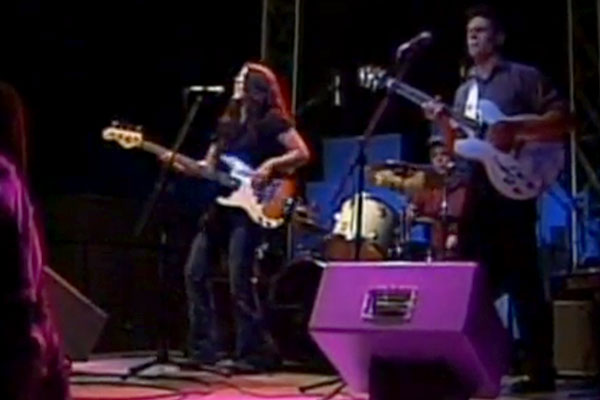
Also available on Spotify.